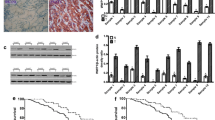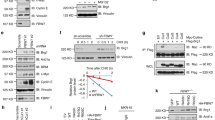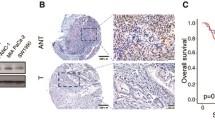Abstract
SGT1 (suppressor of G2 allele of Skp1) plays a role in various cellular processes including kinetochore assembly and protein ubiquitination by interacting with Skp1, a component of SCF E3 ligase complex. However, the function of SGT1 in cancer is largely unknown. Here, we showed that SGT1 was over-expressed in gastric cancer tissues and silencing of SGT1 by siRNAs significantly inhibited the growth and colony formation of gastric cancer cells. We further showed that SGT1 could regulate Akt signaling pathway by modulating Akt ser473 phosphorylation status. Moreover, we found that SGT1 was able to regulate the stability of PHLPP1, which is the direct phosphatase for Akt ser473 phosphorylation. Immunoprecipitation assay revealed that SGT1 could enhance the binding between PHLPP1 and beta-TrCP which has been documented to be able to target PHLPP1 for destruction. Decreased PHLPP1 in SGT1 over-expressed gastric cancer cells failed to dephosphorylate Akt and resulted in increased Akt ser473 phosphorylation and amplified downstream Akt signaling. Thus, our data revealed a previously uncovered role of SGT1 in gastric cancer development, and suggested that SGT1 could be a promising anti-cancer target to against gastric cancer.




Similar content being viewed by others
References
Jemal A, Bray F, Center MM, Ferlay J, Ward E et al (2011) Global cancer statistics. CA Cancer J Clin 61:69–90
Bellacosa A, Kumar CC, Di Cristofano A, Testa JR (2005) Activation of AKT kinases in cancer: implications for therapeutic targeting. Adv Cancer Res 94:29–86
Michl P, Downward J (2005) Mechanisms of disease: PI3K/AKT signaling in gastrointestinal cancers. Z Gastroenterol 43:1133–1139
Sarbassov DD, Guertin DA, Ali SM, Sabatini DM (2005) Phosphorylation and regulation of Akt/PKB by the rictor-mTOR complex. Science 307:1098–1101
Qiao M, Sheng S, Pardee AB (2008) Metastasis and AKT activation. Cell Cycle 7:2991–2996
Georgescu MM (2010) PTEN tumor suppressor network in PI3 K-Akt pathway control. Genes Cancer 1:1170–1177
Li J, Yen C, Liaw D, Podsypanina K, Bose S et al (1997) PTEN, a putative protein tyrosine phosphatase gene mutated in human brain, breast, and prostate cancer. Science 275:1943–1947
Lazar D, Raica M, Sporea I, Taban S, Goldis A et al (2006) Tumor angiogenesis in gastric cancer. Rom J Morphol Embryol 47:5–13
Almhanna K, Strosberg J, Malafa M (2011) Targeting AKT protein kinase in gastric cancer. Anticancer Res 31:4387–4392
Gao T, Furnari F, Newton AC (2005) PHLPP: a phosphatase that directly dephosphorylates Akt, promotes apoptosis, and suppresses tumor growth. Mol Cell 18:13–24
Brognard J, Sierecki E, Gao T, Newton AC (2007) PHLPP and a second isoform, PHLPP2, differentially attenuate the amplitude of Akt signaling by regulating distinct Akt isoforms. Mol Cell 25:917–931
Qiao M, Iglehart JD, Pardee AB (2007) Metastatic potential of 21T human breast cancer cells depends on Akt/protein kinase B activation. Cancer Res 67:5293–5299
Li X, Liu J, Gao T (2009) beta-TrCP-mediated ubiquitination and degradation of PHLPP1 are negatively regulated by Akt. Mol Cell Biol 29:6192–6205
Kitagawa K, Skowyra D, Elledge SJ, Harper JW, Hieter P (1999) SGT1 encodes an essential component of the yeast kinetochore assembly pathway and a novel subunit of the SCF ubiquitin ligase complex. Mol Cell 4:21–33
Mayor A, Martinon F, De Smedt T, Petrilli V, Tschopp J (2007) A crucial function of SGT1 and HSP90 in inflammasome activity links mammalian and plant innate immune responses. Nat Immunol 8:497–503
Kadota Y, Shirasu K, Guerois R (2010) NLR sensors meet at the SGT1-HSP90 crossroad. Trends Biochem Sci 35:199–207
Shirasu K (2009) The HSP90-SGT1 chaperone complex for NLR immune sensors. Annu Rev Plant Biol 60:139–164
Iwatsuki M, Mimori K, Sato T, Toh H, Yokobori T et al (2010) Overexpression of SUGT1 in human colorectal cancer and its clinicopathological significance. Int J Oncol 36:569–575
Mendoza MC, Blenis J (2007) PHLPPing it off: phosphatases get in the Akt. Mol Cell 25:798–800
Molina JR, Agarwal NK, Morales FC, Hayashi Y, Aldape KD et al (2011) PTEN, NHERF1 and PHLPP form a tumor suppressor network that is disabled in glioblastoma. Oncogene 31(10):1264–1274
Chen M, Pratt CP, Zeeman ME, Schultz N, Taylor BS et al (2011) Identification of PHLPP1 as a tumor suppressor reveals the role of feedback activation in PTEN-mutant prostate cancer progression. Cancer Cell 20:173–186
Carver BS, Chapinski C, Wongvipat J, Hieronymus H, Chen Y et al (2011) Reciprocal feedback regulation of PI3 K and androgen receptor signaling in PTEN-deficient prostate cancer. Cancer Cell 19:575–586
Guardavaccaro D, Kudo Y, Boulaire J, Barchi M, Busino L et al (2003) Control of meiotic and mitotic progression by the F box protein beta-Trcp1 in vivo. Dev Cell 4:799–812
Peschiaroli A, Dorrello NV, Guardavaccaro D, Venere M, Halazonetis T et al (2006) SCFbetaTrCP-mediated degradation of Claspin regulates recovery from the DNA replication checkpoint response. Mol Cell 23:319–329
Ougolkov A, Zhang B, Yamashita K, Bilim V, Mai M et al (2004) Associations among beta-TrCP, an E3 ubiquitin ligase receptor, beta-catenin, and NF-kappaB in colorectal cancer. J Natl Cancer Inst 96:1161–1170
Frescas D, Pagano M (2008) Deregulated proteolysis by the F-box proteins SKP2 and beta-TrCP: tipping the scales of cancer. Nat Rev Cancer 8:438–449
Acknowledgments
We thank the anonymous reviewer for the suggestions that help to improve the work.
Conflict of interest
None of the authors has any potential conflicts of interest.
Author information
Authors and Affiliations
Corresponding authors
Additional information
Ganglong Gao and Kun Tao contributed equally to this study
Electronic supplementary material
Below is the link to the electronic supplementary material.
Rights and permissions
About this article
Cite this article
Gao, G., Kun, T., Sheng, Y. et al. SGT1 regulates Akt signaling by promoting beta-TrCP-dependent PHLPP1 degradation in gastric cancer cells. Mol Biol Rep 40, 2947–2953 (2013). https://doi.org/10.1007/s11033-012-2363-8
Received:
Accepted:
Published:
Issue Date:
DOI: https://doi.org/10.1007/s11033-012-2363-8




